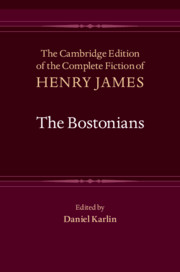Book contents
- Frontmatter
- Contents
- Acknowledgements
- List of Abbreviations
- General Editors’ Preface
- General Chronology of James’s Life and Writings
- Introduction
- Textual Introduction
- Chronology of Composition and Production
- Bibliography
- The Bostonians
- Glossary of Foreign Words and Phrases
- Notes
- Textual Variants
- Emendations
- Appendices
XVII
Published online by Cambridge University Press: 11 April 2021
- Frontmatter
- Contents
- Acknowledgements
- List of Abbreviations
- General Editors’ Preface
- General Chronology of James’s Life and Writings
- Introduction
- Textual Introduction
- Chronology of Composition and Production
- Bibliography
- The Bostonians
- Glossary of Foreign Words and Phrases
- Notes
- Textual Variants
- Emendations
- Appendices
Summary
THE next time Verena saw Olive, she said to her that she was ready to make the promise she had asked the other night; but, to her great surprise, this young woman answered her by a question intended to check such rashness. Miss Chancellor raised a warning finger; she had an air of dissuasion almost as solemn as her former pressure; her passionate impatience appeared to have given way to other considerations, to be replaced by the resignation that comes with deeper reflection. It was tinged in this case, indeed, by such bitterness as might be permitted to a young lady who cultivated the brightness of a great faith.
“Don't you want any promise at present?” Verena asked. “Why, Olive, how you change!”
“My dear child, you are so young — so strangely young. I am a thousand years old; I have lived through generations — through centuries. I know what I know by experience; you know it by imagination. That is consistent with your being the fresh, bright creature that you are. I am constantly forgetting the difference between us — that you are a mere child as yet, though a child destined for great things. I forgot it the other night, but I have remembered it since. You must pass through a certain phase, and it would be very wrong in me to pretend to suppress it. That is all clear to me now; I see it was my jealousy that spoke — my restless, hungry jealousy. I have far too much of that; I oughtn't to give any one the right to say that it's a woman's quality. I don't want your signature; I only want your confidence — only what springs from that. I hope with all my soul that you won't marry; but if you don't it must not be because you have promised me. You know what I think — that there is something noble done when one makes a sacrifice for a great good. Priests — when they were real priests — never married, and what you and I dream of doing demands of us a kind of priesthood. It seems to me very poor, when friendship and faith and charity and the most interesting occupation in the world — when such a combination as this doesn't seem, by itself, enough to live for.
- Type
- Chapter
- Information
- The Bostonians , pp. 121 - 128Publisher: Cambridge University PressPrint publication year: 2019

